The Letter and the Little Rose of Dublin
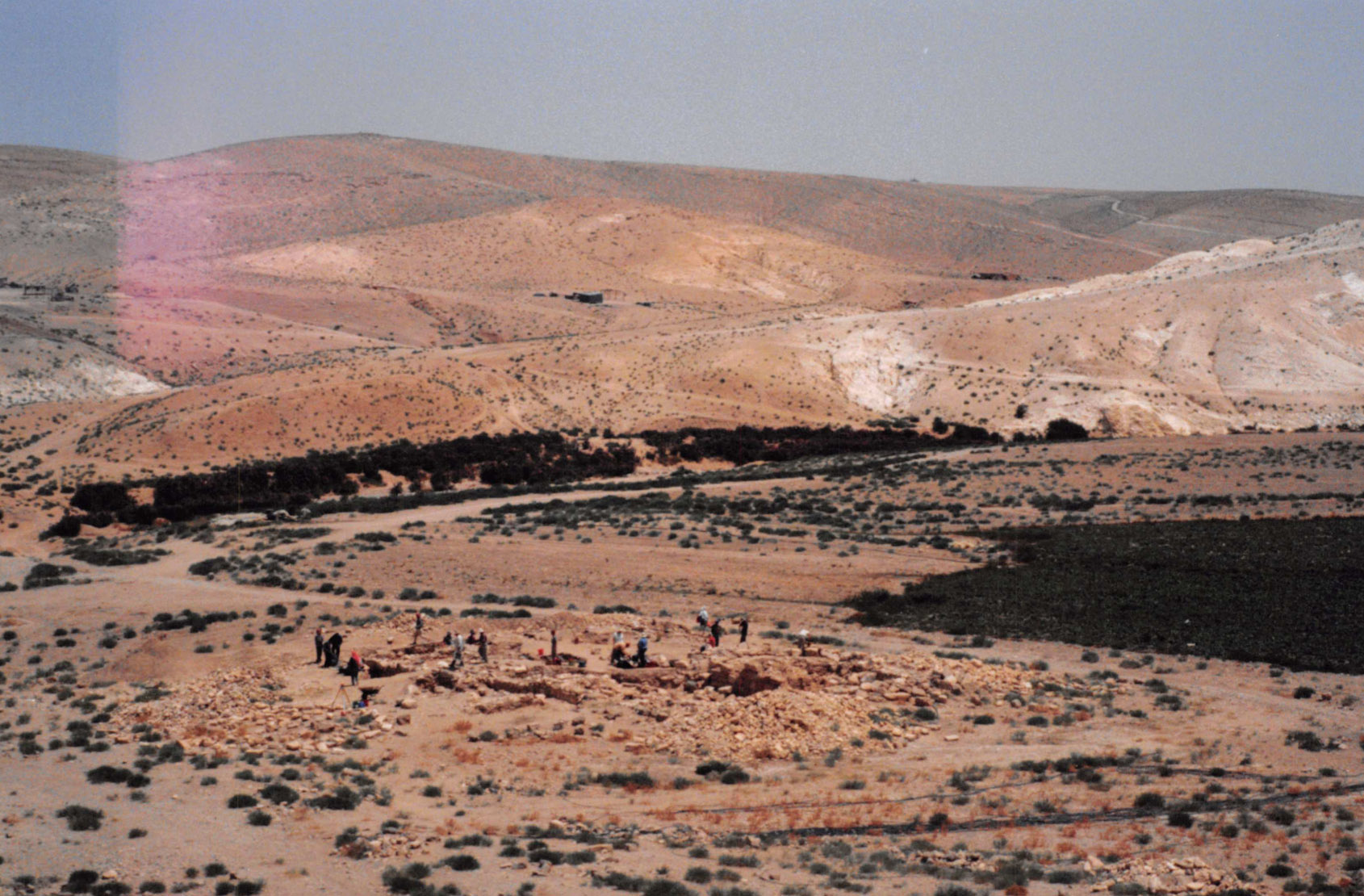
You could see for miles in every direction from the Wadi ath-Thamad Project site in central Jordan. To many, it would have looked like nothing more than a pile of rocks sitting on the top of a small hill of sand encircled by a few threads of green grass clasping to the faintest bits of moisture in the desert. Slabs of steel sheets organized into makeshift prefab houses dotted the horizon from where the local Bedouins would make their way to the site – an opportunity for them to haul rocks and look for loose pottery in exchange for a pittance of paper money that they could trade for meagre modern conveniences like digital watches or plastic toys for the children. Our caravan would roll in just as the sun was beginning to peak through the horizon – a group of Canadian university students and volunteers heading to the site to learn the finer points, and day-to-day operations, of archaeology and avoid the midday sun where temperatures could rise to well over 40 degrees Celsius.
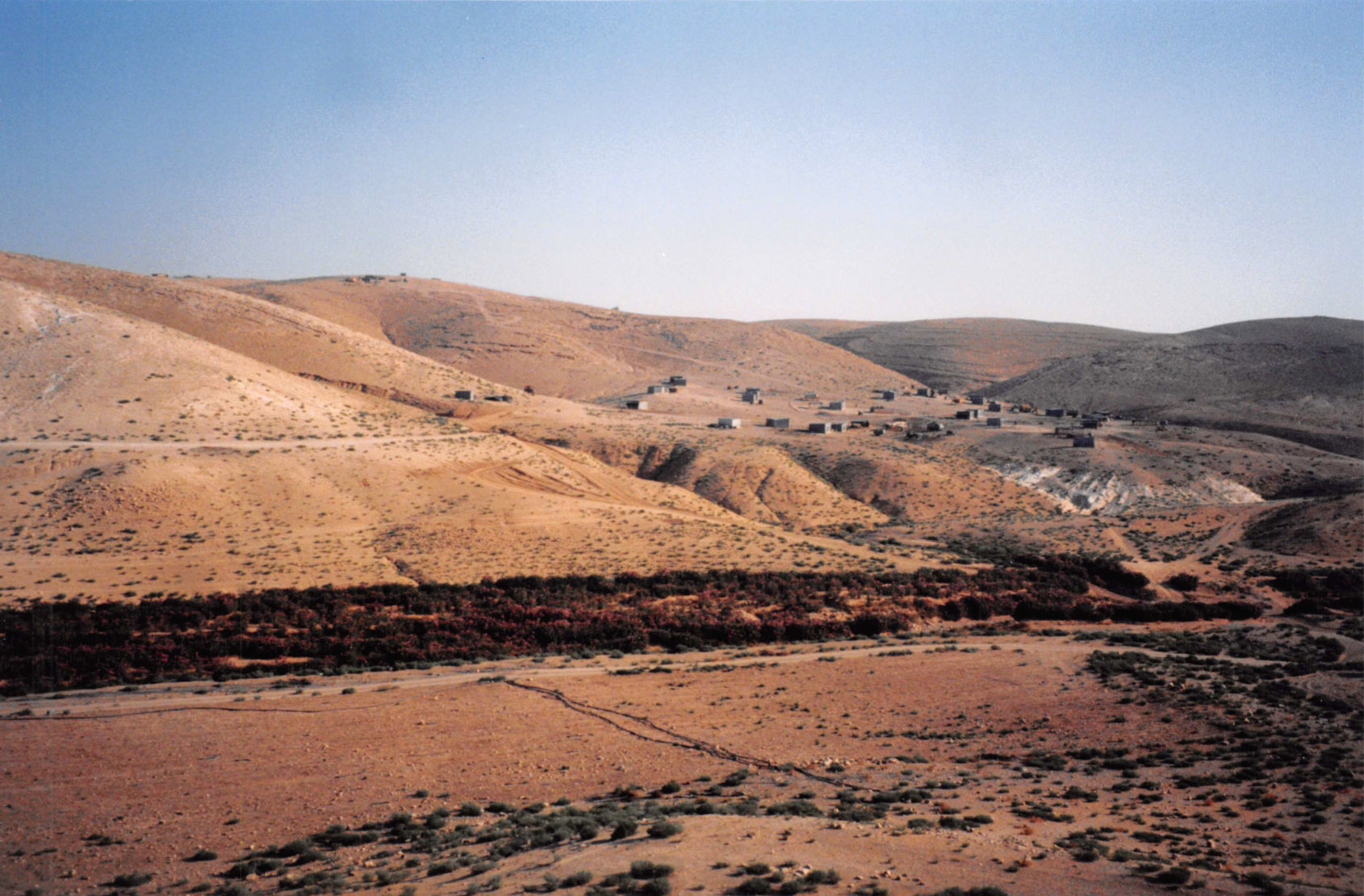 I was the supervisor of my square, a 10-meter by 10-meter area of rock and dust, and responsible for logging information like changes in the composition of the soil, collecting and logging pottery, taking elevations and drawing top plans, as well as writing a weekly summary of all of the activity in my square to pass on to my field supervisor at the end of the 6-week season. The desert can be a shock to anyone not accustomed to such arid conditions and I learned on that first day at the site that there was not enough moisture in the air to keep my contact lenses from drying out right on my eyes. Blind without them, the loss would have made me a liability on site, so I cried out for assistance. I remained perfectly still so as not to lose the errant contact lens in the sand. One of the volunteers from the next square came running to my aid with a water bottle to clean and return some moisture to the lens. Using the reflection in her sunglasses I was able to navigate the contact lens back onto my eye and make it through the day. That’s how I met Roisin.
I was the supervisor of my square, a 10-meter by 10-meter area of rock and dust, and responsible for logging information like changes in the composition of the soil, collecting and logging pottery, taking elevations and drawing top plans, as well as writing a weekly summary of all of the activity in my square to pass on to my field supervisor at the end of the 6-week season. The desert can be a shock to anyone not accustomed to such arid conditions and I learned on that first day at the site that there was not enough moisture in the air to keep my contact lenses from drying out right on my eyes. Blind without them, the loss would have made me a liability on site, so I cried out for assistance. I remained perfectly still so as not to lose the errant contact lens in the sand. One of the volunteers from the next square came running to my aid with a water bottle to clean and return some moisture to the lens. Using the reflection in her sunglasses I was able to navigate the contact lens back onto my eye and make it through the day. That’s how I met Roisin.
Roisin had come from Ireland and was one of the few international volunteers on the project. You live in close confines with the volunteers when you’re on a dig and I had no choice in my roommates who were a bit of an ordeal to cope with. One would dance around our hotel room, hairy, fat, half-naked most of the time and singing songs by ABBA while the other had the mind of a child and, as we realized later, had been sent there by his parents who were happy to be relieved of the burden of having him around. The schedule was also gruelling. The first obstacle was the 7-hour time difference from back home which meant irregular sleeping patterns that were often interrupted either by prayer call from the mosques or the occasional sound of gunfire from a nearby wedding celebration. Breakfast was served promptly at 4 am to ensure that we had adequate time to get to the bus which left for the site at 5. Then there were 6 hours on-site in the heat and a hot, sweaty, and dusty bus ride back to Madaba when the sun hit noon. By the time the caravan got back to the hotels we always had a choice: eat or sleep. The second half of the day from 3 pm to 6 pm involved pottery washing and drawings and other menial tasks before heading back to the restaurant, assuming you still had the energy or had chosen to sleep earlier, before returning to the hotel and collapsing from exhaustion. Hot and dirty with chapped lips and wind burnt cheeks, with my family, my girlfriend, and everyone I usually went to for solace in difficult times, so far away, Roisin was my antidote to this situation.
Because I was a square supervisor I had a few added responsibilities compared to the average volunteer as I was in charge of the square binder. It meant forgoing the pleasure of having free time on the weekend because there was always something that needed updating. Roisin and the others would return from wherever they had gone during their free time and Roisin was the one who seemed happy enough to listen to me bitch about having to miss out. We instantly developed a rapport and after she helped me with my contact lens on that first day there was never a silent moment between us. We were kindred spirits and had a repartee that kept the other volunteers entertained. We were always together and had each other’s back. It was then that I realized that the friends that we develop such strong bonds with as children materialize out of convenience from their proximity, but that the people we might have the strongest instant connection with might be spread all over the world and it saddened me that the world could seem so big. When the six weeks were over and I returned to Canada and Roisin returned to Ireland I had no doubt that we’d find a way to remain close friends. But, we exchanged emails irregularly for a couple of years afterward until the correspondence gradually became more and more infrequent and eventually ceased altogether.
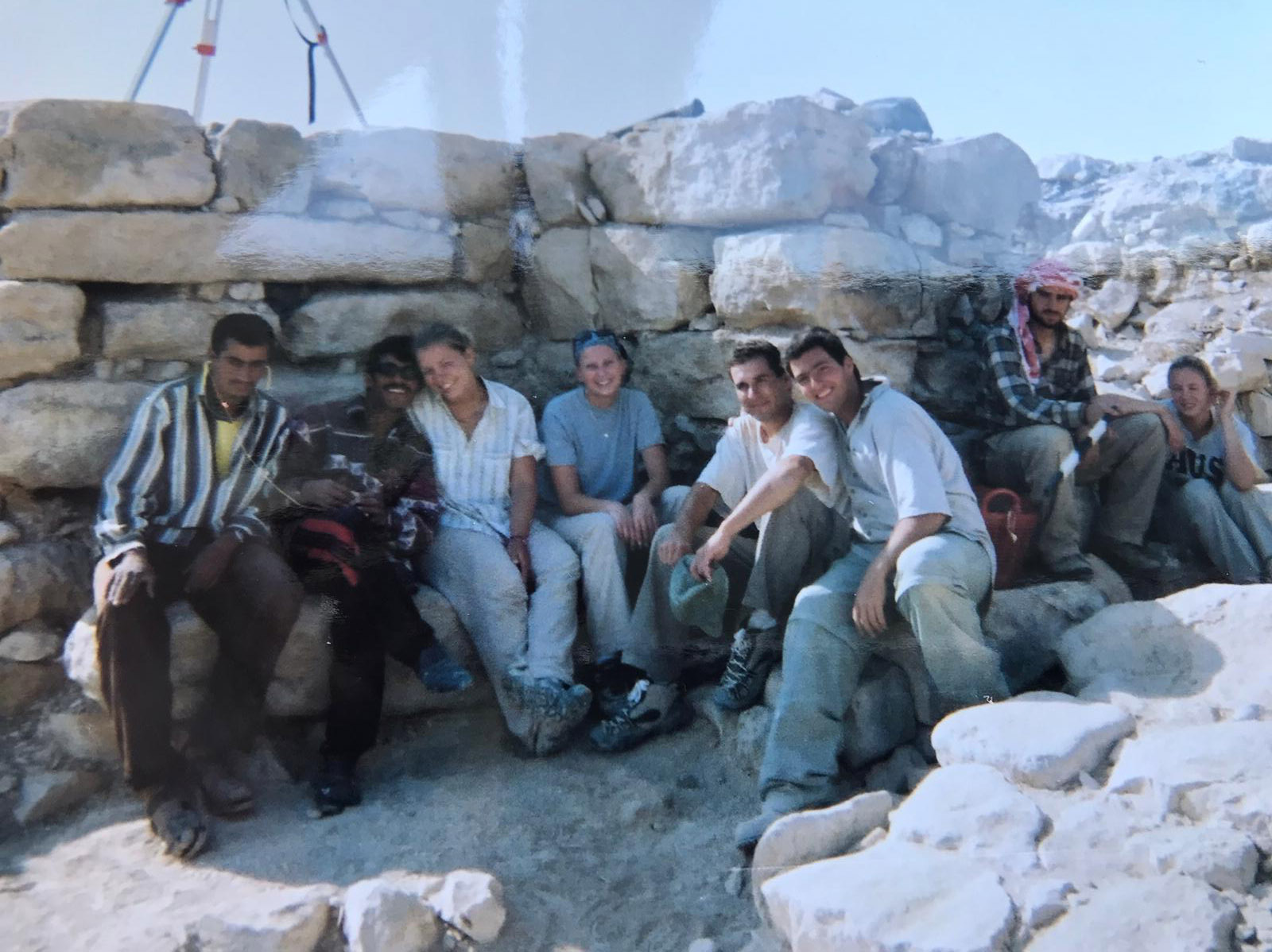
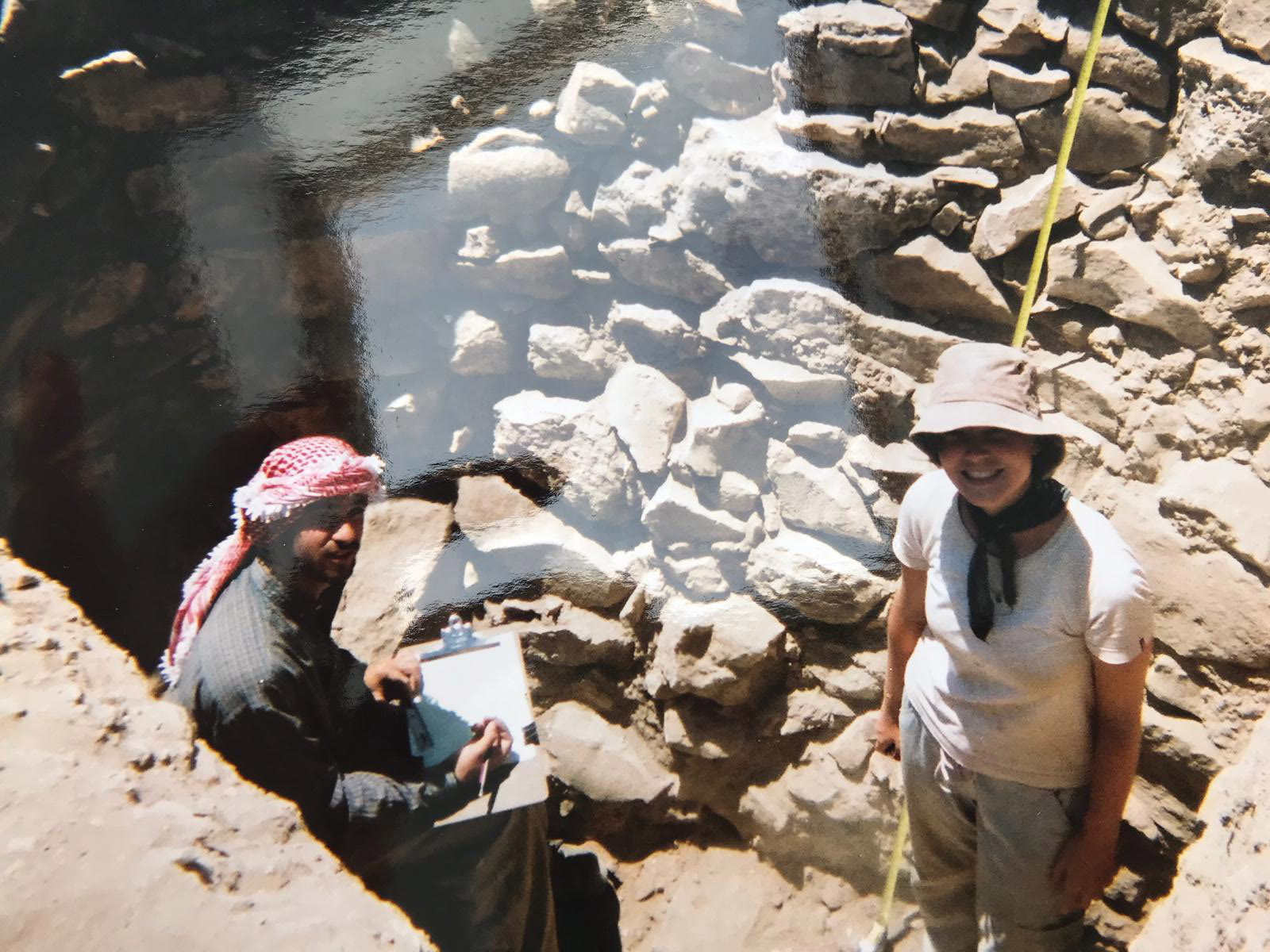
Volunteers from Wadi ath-Thamad Project. Roisin and I are on the far right.
Roisin and I working together in my square.
A person’s past is an interesting and unique thing. Like the pantry, our past holds onto things we don’t use daily. Some people live in the moment and only eat what’s fresh, but I have big pantry full of memories and people I’ve collected over the years from all over the world and, when adult life really took hold, Roisin became like an exotic dried herb that I didn’t have a recipe for. But every time I would open the pantry door she was there and I would think to myself that I should really find a recipe.
That opportunity finally came in 2018 when I was preparing to visit Russia for the World Cup. At the time, my most affordable gateway from North America to Europe was via Dublin and so I decided I would at least do what I could to track her down. When we first met, social media didn’t exist and email was still a novel, and not widely used, tool. At the time it was still more common for people to send postcards and handwritten letters (a means of correspondence which, today, seems to have completely died out) – but I managed to track down an old email[i] that contained the home address where she lived when we first met. After being completely unable to find her on social media, I reckoned that parents don’t move around all that much and the best chance I had of reaching her was by sending a simple letter to that address. I dropped the letter in the mail half thinking that a stranger would open it and have a laugh before tossing it in the bin. But, some three weeks later, Roisin sent an email and we got back in touch.
After almost 20 years our lives, understandably, had changed considerably. And though she was overjoyed to have heard from me again after so long, I could sense her apprehension when I suggested that we meet as I passed through Dublin on my way to Russia. It’s always a risk trying to recapture old memories and make them live again. It’s like visiting one’s old elementary school, whose halls once seemed so cavernous and imposing, and realizing just how it small it is; or like watching a film that you loved as kid and realizing that it’s not actually very good; or like a foreign city where you had an amazing experience only to then have your wallet stolen the next time you visited. We arranged to meet outside the Trinity College gate and, as the day approached, suddenly I had my own apprehensions. It had yet to be seen if our connection could translate itself from that brief window of time so long ago into adult life. Sometimes memories are better off locked away and not tampered with.
It was a beautiful sunshiny day in late May when I arrived promptly at the agreed upon time outside the gate. Through the crowds of tourists, she recognized me and walked over and gave me a hug. “Roisin,” I said, “why did you suggest we meet in the absolute most crowded corner in all of Dublin after 20 years and running the risk of not being able to recognize each other?” She burst out laughing, “I know! I only thought of it right after I arrived and I saw all of these people. But it doesn’t matter now.”
The desert had been replaced by the walkways and gardens of Dublin, but within seconds the banter was like we were back in Madaba. She had traveled all over the world in her twenties, just like me, and eventually became a teacher. She married a long-time love interest of hers and they had three girls together and when we met she was enjoying being a mom. We sat in St. Stephen’s Green and reminisced and swapped Simpsons references. I ended up traveling through again after the World Cup on my way back to Canada and was invited to her house for a barbecue where I got to meet her husband, the kids, and even her dad.
Life moves on and Dublin is her home but just a station on the line where I stop in from time to time. Moving south from Belfast to round out my visit in the UK, it wouldn’t have been complete without shooting the shit with Roisin for an hour or two. In the year between visits she’d had another child – a boy, finally – and I got to see the whole family again. But it was during our walk along the seawall in Clontarf, when all the noise of life was at bay for just a minute, that the banter picked up and we were ‘us’. Ten thousand steps and just as many laughs in the time that passed too swiftly. The world feels a little smaller and less intimidating knowing that she’s here and that we didn’t let our friendship just wilt like a neglected house plant because of the distance.
I told her once that in another life I would have been around more; I would have been there through good times and bad; I would have pulled her hair back when she drank too much; I would have been there to see her get married; I would have been there for dinner parties and pub talk; I would have given her advice (probably misguided) when she sought it and I would have happily let her scold me for offering it when it wasn’t warranted – but that time passed. Thankfully parents don’t move all that much and that hand written letter I sent into the wind reached its desired destination. The connection (or reconnection) is still new and kept at a distance with our lives having headed along their respective trajectories, but now I get to stroll into Dublin once in a while and have a laugh with her and her family. Of all the stations running along the line of the Coddiwomple Express, Dublin is one of the few regular routes. And who knows what the future holds but it’s not hard to imagine a time, many years from now, with the both of us sitting in Stephen’s Green, feeding the birds, telling stories, reminiscing about Jordan and the desert, quoting Homer Simpson, and laughing our asses off.
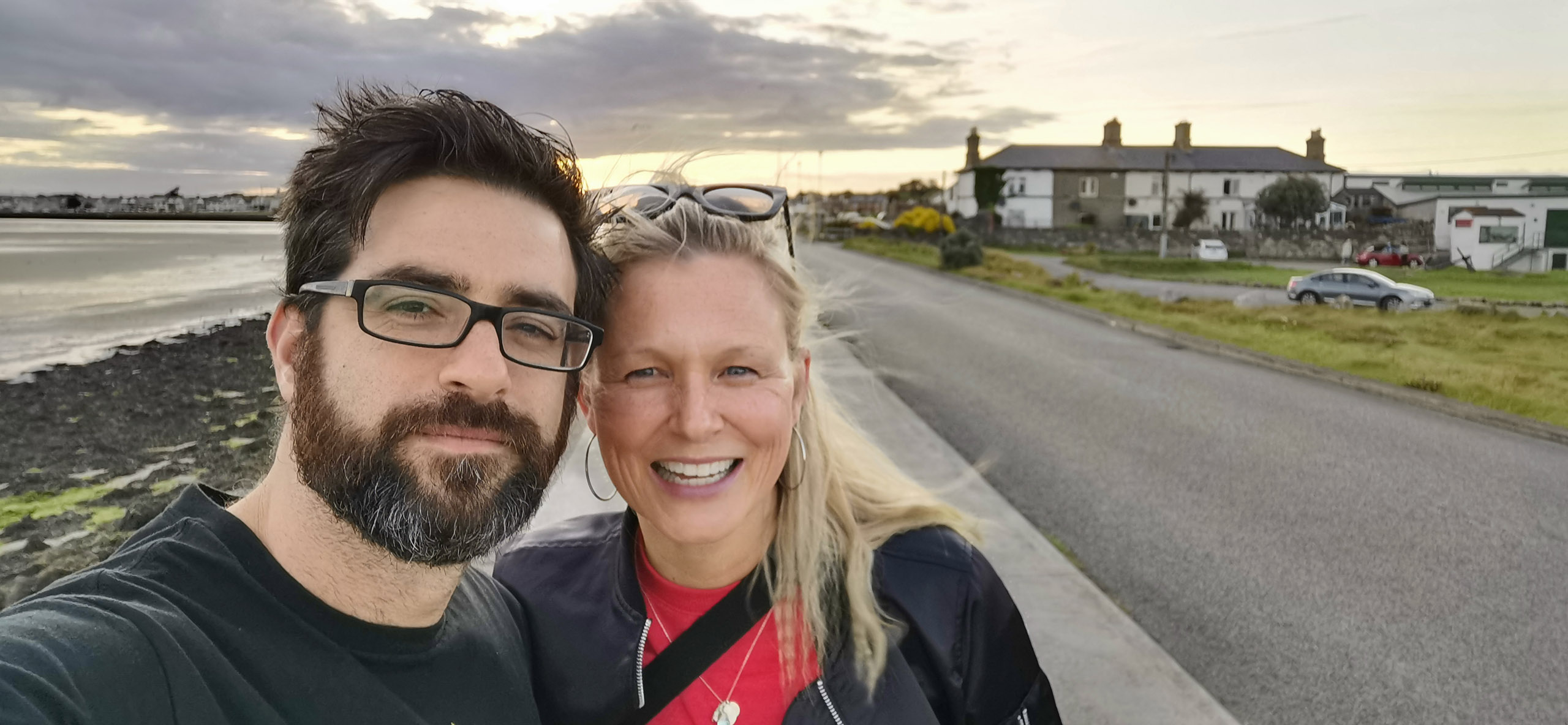
[i] Once upon a time it cost money to have an email address but Hotmail was a way to skirt having to pay for an email account as it didn’t reside with your service provider. Obviously, 20 years on, better solutions came along so that particular email address that I had through Hotmail fell into disuse. Somewhere way back in the old cerebral storage bank I could have sworn that I had subpoenaed Roisin for her home address in the hopes of sending her a Christmas card. Having not used the account in at least a decade, locating the password and gaining access to the account was a small adventure in itself, but I managed it.